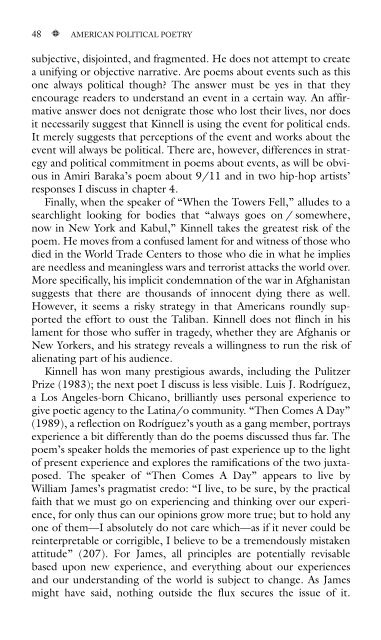american political poetry in the 21st century - STIBA Malang
american political poetry in the 21st century - STIBA Malang
american political poetry in the 21st century - STIBA Malang
You also want an ePaper? Increase the reach of your titles
YUMPU automatically turns print PDFs into web optimized ePapers that Google loves.
48 AMERICAN POLITICAL POETRY<br />
subjective, disjo<strong>in</strong>ted, and fragmented. He does not attempt to create<br />
a unify<strong>in</strong>g or objective narrative. Are poems about events such as this<br />
one always <strong>political</strong> though? The answer must be yes <strong>in</strong> that <strong>the</strong>y<br />
encourage readers to understand an event <strong>in</strong> a certa<strong>in</strong> way. An affirmative<br />
answer does not denigrate those who lost <strong>the</strong>ir lives, nor does<br />
it necessarily suggest that K<strong>in</strong>nell is us<strong>in</strong>g <strong>the</strong> event for <strong>political</strong> ends.<br />
It merely suggests that perceptions of <strong>the</strong> event and works about <strong>the</strong><br />
event will always be <strong>political</strong>. There are, however, differences <strong>in</strong> strategy<br />
and <strong>political</strong> commitment <strong>in</strong> poems about events, as will be obvious<br />
<strong>in</strong> Amiri Baraka’s poem about 9/11 and <strong>in</strong> two hip-hop artists’<br />
responses I discuss <strong>in</strong> chapter 4.<br />
F<strong>in</strong>ally, when <strong>the</strong> speaker of “When <strong>the</strong> Towers Fell,” alludes to a<br />
searchlight look<strong>in</strong>g for bodies that “always goes on / somewhere,<br />
now <strong>in</strong> New York and Kabul,” K<strong>in</strong>nell takes <strong>the</strong> greatest risk of <strong>the</strong><br />
poem. He moves from a confused lament for and witness of those who<br />
died <strong>in</strong> <strong>the</strong> World Trade Centers to those who die <strong>in</strong> what he implies<br />
are needless and mean<strong>in</strong>gless wars and terrorist attacks <strong>the</strong> world over.<br />
More specifically, his implicit condemnation of <strong>the</strong> war <strong>in</strong> Afghanistan<br />
suggests that <strong>the</strong>re are thousands of <strong>in</strong>nocent dy<strong>in</strong>g <strong>the</strong>re as well.<br />
However, it seems a risky strategy <strong>in</strong> that Americans roundly supported<br />
<strong>the</strong> effort to oust <strong>the</strong> Taliban. K<strong>in</strong>nell does not fl<strong>in</strong>ch <strong>in</strong> his<br />
lament for those who suffer <strong>in</strong> tragedy, whe<strong>the</strong>r <strong>the</strong>y are Afghanis or<br />
New Yorkers, and his strategy reveals a will<strong>in</strong>gness to run <strong>the</strong> risk of<br />
alienat<strong>in</strong>g part of his audience.<br />
K<strong>in</strong>nell has won many prestigious awards, <strong>in</strong>clud<strong>in</strong>g <strong>the</strong> Pulitzer<br />
Prize (1983); <strong>the</strong> next poet I discuss is less visible. Luis J. Rodríguez,<br />
a Los Angeles-born Chicano, brilliantly uses personal experience to<br />
give poetic agency to <strong>the</strong> Lat<strong>in</strong>a/o community. “Then Comes A Day”<br />
(1989), a reflection on Rodríguez’s youth as a gang member, portrays<br />
experience a bit differently than do <strong>the</strong> poems discussed thus far. The<br />
poem’s speaker holds <strong>the</strong> memories of past experience up to <strong>the</strong> light<br />
of present experience and explores <strong>the</strong> ramifications of <strong>the</strong> two juxtaposed.<br />
The speaker of “Then Comes A Day” appears to live by<br />
William James’s pragmatist credo: “I live, to be sure, by <strong>the</strong> practical<br />
faith that we must go on experienc<strong>in</strong>g and th<strong>in</strong>k<strong>in</strong>g over our experience,<br />
for only thus can our op<strong>in</strong>ions grow more true; but to hold any<br />
one of <strong>the</strong>m—I absolutely do not care which—as if it never could be<br />
re<strong>in</strong>terpretable or corrigible, I believe to be a tremendously mistaken<br />
attitude” (207). For James, all pr<strong>in</strong>ciples are potentially revisable<br />
based upon new experience, and everyth<strong>in</strong>g about our experiences<br />
and our understand<strong>in</strong>g of <strong>the</strong> world is subject to change. As James<br />
might have said, noth<strong>in</strong>g outside <strong>the</strong> flux secures <strong>the</strong> issue of it.











